The expression resolver allows for metadata values, as well as a limited amount of other message information to be inserted into configuration to create dynamic values. The screenshot below shows a simple example where a new payload will be added (to a multi-payload message), where the new payload ID will be the metadata value associated with metadata-key.

Standard Messages
The standard Adaptris Message type has four different expressions for looking up data.
Message Unique ID
This will resolve the current message unique ID.
%message{%uniqueId}
Message Payload Size
This will resolve the current payload size, in bytes.
%message{%size}
Message Payload
This will resolve the current payload in its entirety.
%message{%payload}
Metadata Keys
If the expression within %message does not start with % then it is
treated as a metadata key, and will resolve the associated value. For
instance, if you have a metadata key/value pair day=Monday then
%message{day} would resolve to Monday.
%message{…}
Multi-Payload Messages
The following expressions is for referencing any given payload within a multi-payload message. This can be particularly useful if you want to keep a history of payload changes; a before and after each service type of thing.
%payload{id:…}
External Resolvers
Environment
This resolves values based on the associated environment variable. For
example %env{HOSTNAME} will return the value of the environment
variable HOSTNAME. If the variable not defined then the
variable will be returned as is.
%env{…}
System Properties
This resolver will resolve values based on the associated system
property; for example %sysprop{my.sysprop} will return the value of
the system property my.sysprop. If the property is not defined then
the property name will be returned as is.
%sysprop{…}
XPath
The XPath resolver allows for part of an XML payload to be extracted using an XPath expression.
%payload{xpath:…}
Example
XML Payload
<?xml version="1.0" encoding="utf-8"?>
<Wikimedia>
<projects>
<project name="Wikipedia" launch="2001-01-05">
<editions>
<edition language="English">en.wikipedia.org</edition>
<edition language="German">de.wikipedia.org</edition>
<edition language="French">fr.wikipedia.org</edition>
<edition language="Polish">pl.wikipedia.org</edition>
<edition language="Spanish">es.wikipedia.org</edition>
</editions>
</project>
<project name="Wiktionary" launch="2002-12-12">
<editions>
<edition language="English">en.wiktionary.org</edition>
<edition language="French">fr.wiktionary.org</edition>
<edition language="Vietnamese">vi.wiktionary.org</edition>
<edition language="Turkish">tr.wiktionary.org</edition>
<edition language="Spanish">es.wiktionary.org</edition>
</editions>
</project>
</projects>
</Wikimedia>
Expression
%payload{xpath:/Wikimedia/projects/project/@name}
Resolved Value
Wikipedia,Wiktionary
Xpath as a Data Input Parameter- Weather Forecast Report Example
Before we start it’s important to note that, exctracting the XML in such a manner best avoided unless working with small files and small queries as doing so will be to the detriment of performance. This is the result of parsing the payload and recreating the entire Document Object Model (DOM) for each attempt in resolving a query. A more appropriate solution for bigger files and queries can be found here: Xpath Service Example
This example will demonstrate the use of Xpath expression resolution as a data input parameter. Below is a simple adapter that checks parts of a weather forecast based on a polling interval consumer. It then outputs the calls made into a simple text file in your adapter’s subdirectory. For this to run you will need to go to openweathermap and sign-up for a free account to recieve an API key that will allow you to succesfully make calls to their API. The next step is to configure a fresh adapter and in the interest of making it easier, below is the XML config you will need. Copy it and replace what’s currently in your adapter.xml file:
Adapter Config XML
<adapter>
<unique-id>WeatherForecastAdapter</unique-id>
<start-up-event-imp>com.adaptris.core.event.StandardAdapterStartUpEvent</start-up-event-imp>
<heartbeat-event-imp>com.adaptris.core.HeartbeatEvent</heartbeat-event-imp>
<shared-components>
<connections/>
<services/>
</shared-components>
<event-handler class="default-event-handler">
<unique-id>DefaultEventHandler</unique-id>
<connection class="null-connection">
<unique-id>NullConnectionEventHandler</unique-id>
</connection>
<producer class="null-message-producer">
<unique-id>NullMessageProducerEventHandler</unique-id>
</producer>
</event-handler>
<heartbeat-event-interval>
<unit>MINUTES</unit>
<interval>60</interval>
</heartbeat-event-interval>
<message-error-handler class="null-processing-exception-handler">
<unique-id>NullProcessingExceptionHandler</unique-id>
</message-error-handler>
<failed-message-retrier class="no-retries">
<unique-id>NoRetries</unique-id>
</failed-message-retrier>
<channel-list>
<channel>
<consume-connection class="null-connection">
<unique-id>null-connection</unique-id>
</consume-connection>
<produce-connection class="null-connection">
<unique-id>null-connection</unique-id>
</produce-connection>
<workflow-list>
<standard-workflow>
<consumer class="polling-trigger">
<message-factory class="multi-payload-message-factory">
<default-char-encoding>UTF-8</default-char-encoding>
<default-payload-id>default-payload</default-payload-id>
</message-factory>
<unique-id>FixedPoller</unique-id>
<poller class="fixed-interval-poller">
<poll-interval>
<unit>HOURS</unit>
<interval>2</interval>
</poll-interval>
</poller>
</consumer>
<service-collection class="service-list">
<unique-id>service-list</unique-id>
<services>
<http-request-service>
<unique-id>HTTPS-REQUEST</unique-id>
<url>http://api.openweathermap.org/data/2.5/weather?q=London,uk&_APPID{API KEY HERE}_&mode=xml</url>
<content-type>xml</content-type>
<method>GET</method>
<response-header-handler class="http-discard-response-headers"/>
<request-header-provider class="http-no-request-headers"/>
<authenticator class="http-no-authentication"/>
</http-request-service>
<add-payload-service>
<unique-id>Forecast</unique-id>
<new-payload-id>WeatherForecast</new-payload-id>
<new-payload class="constant-data-input-parameter">
<value> City: %payload{xpath:current/city/@name}
Country: %payload{xpath:current/city/country/text()}
Wind Level: %payload{xpath:current/wind/speed/@name}
Wind Direction: %payload{xpath:current/wind/direction/@name}
Cloud frequency: %payload{xpath:current/clouds/@name}
Temperature: %payload{xpath:current/temperature/@value} %payload{xpath:current/temperature/@unit}
Humidity: %payload{xpath:current/humidity/@value}%payload{xpath:current/humidity/@unit}
Raining: %payload{xpath:current/precipitation/@mode}
</value>
</new-payload>
</add-payload-service>
</services>
</service-collection>
<producer class="fs-producer">
<message-factory class="default-message-factory">
<default-char-encoding>UTF-8</default-char-encoding>
</message-factory>
<unique-id>Output File</unique-id>
<create-dirs>true</create-dirs>
<fs-worker class="fs-nio-worker"/>
<filename-creator class="formatted-filename-creator">
<filename-format>Date-%2$tF-weatherForecast-Hour-%2$tH-Minute-%2$tM_MsgID-%1$s.txt</filename-format>
</filename-creator>
<base-directory-url>./weatherForecastOutput</base-directory-url>
</producer>
<send-events>true</send-events>
<produce-exception-handler class="null-produce-exception-handler"/>
<unique-id>Workflow-1</unique-id>
<message-metrics-interceptor>
<unique-id>Workflow-1-MessageMetrics</unique-id>
<timeslice-duration>
<unit>MINUTES</unit>
<interval>5</interval>
</timeslice-duration>
<timeslice-history-count>12</timeslice-history-count>
</message-metrics-interceptor>
<in-flight-workflow-interceptor>
<unique-id>Workflow-1-InFlight</unique-id>
</in-flight-workflow-interceptor>
<message-logger class="message-logging-full"/>
</standard-workflow>
</workflow-list>
<unique-id>Channel-1</unique-id>
</channel>
</channel-list>
<message-error-digester class="standard-message-error-digester">
<unique-id>ErrorDigest</unique-id>
<digest-max-size>100</digest-max-size>
</message-error-digester>
</adapter>
Once the adapter is started navigate to the config page it should look like the below:
The Xpath Adapter
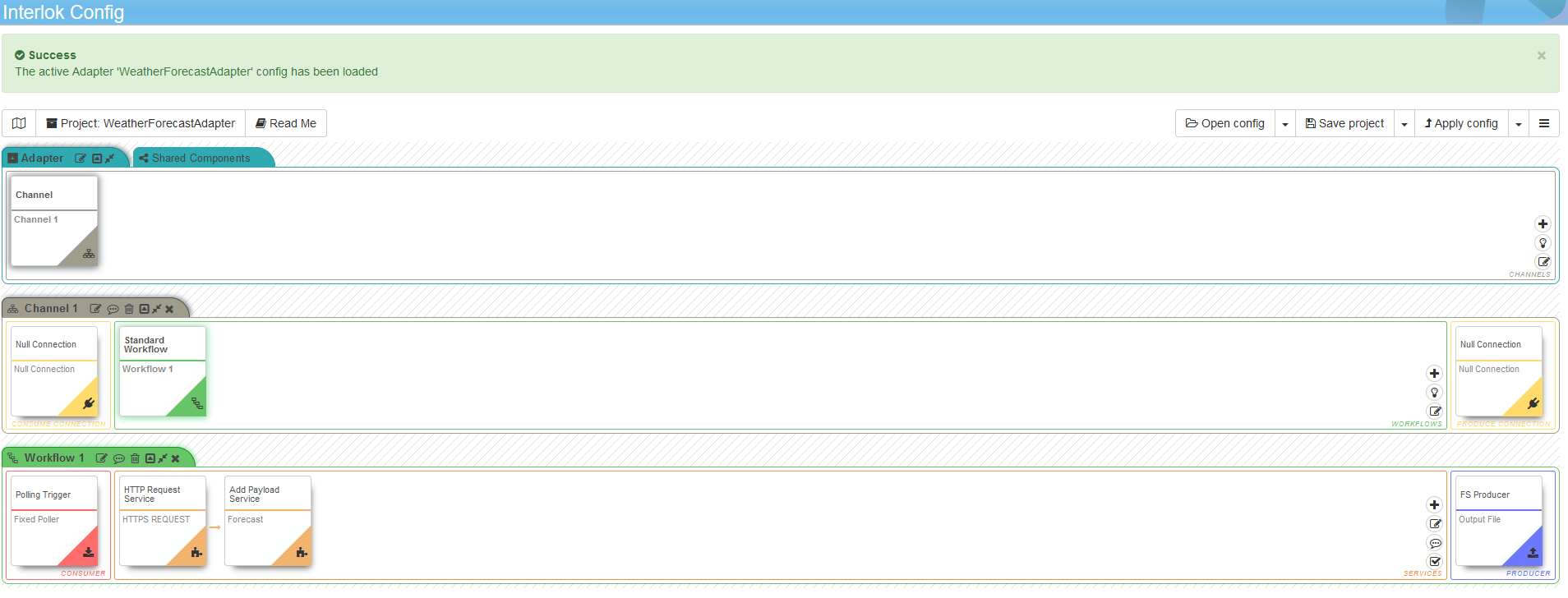
The polling consumer
Set to 2 hour intervals
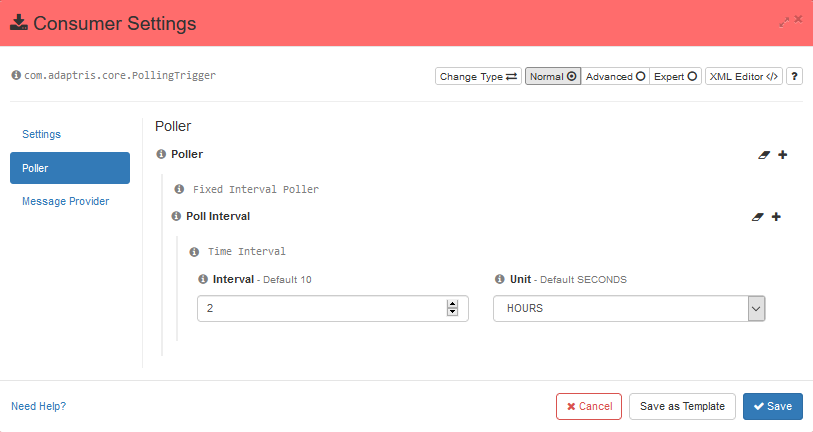
The HTTP GET request
Pointing to the correct address
- (dont forget to update the API Key to your own)
- In the below draw attention to the content type. In this case as we are expecting to receive xml from the GET request, therefore we that is what we set the content type to.
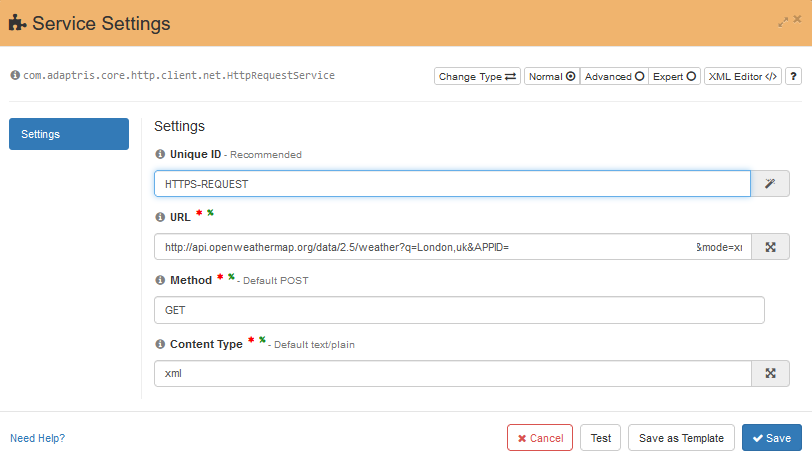
http://api.openweathermap.org/data/2.5/weather?q=London,uk&_APPID{INSERT API KEY HERE}_&mode=xml
The ‘Add Payload Service’
The Xpath expressions inputing the information we want extracted from the API
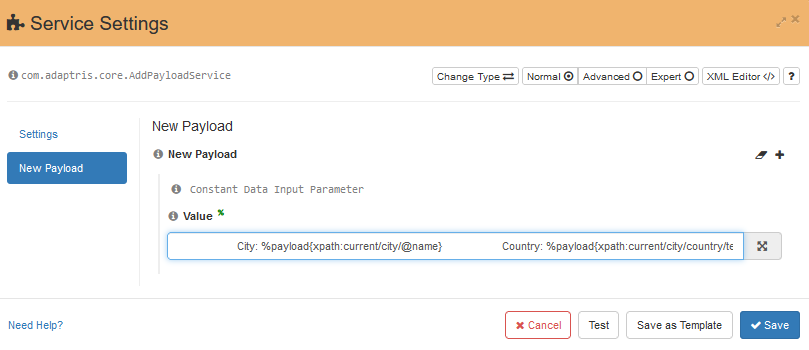
The xpath queries
City: %payload{xpath:current/city/@name}
Country: %payload{xpath:current/city/country/text()}
Wind Level: %payload{xpath:current/wind/speed/@name}
Wind Direction: %payload{xpath:current/wind/direction/@name}
Cloud frequency: %payload{xpath:current/clouds/@name}
Temperature: %payload{xpath:current/temperature/@value} %payload{xpath:current/temperature/@unit}
Humidity: %payload{xpath:current/humidity/@value}%payload{xpath:current/humidity/@unit}
Raining: %payload{xpath:current/precipitation/@mode}
The Producer
creating the weather forecast directory and the report itself
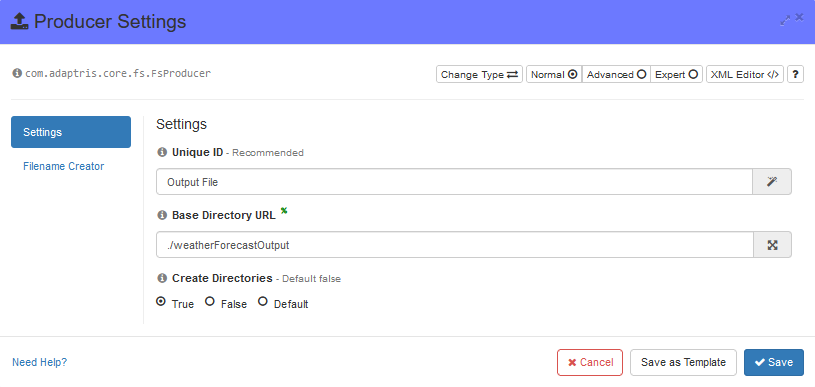
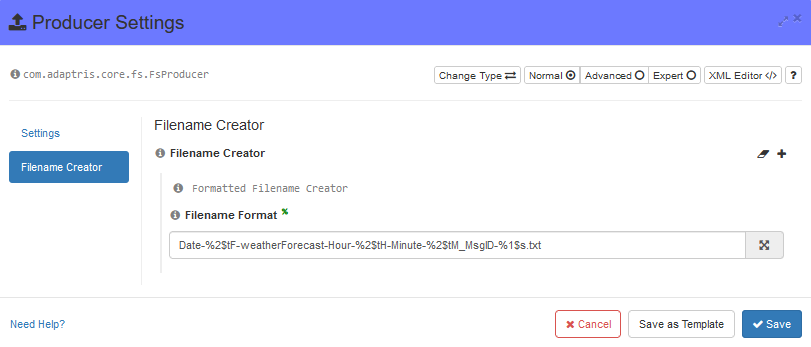
All this should culminate in a text file being created every 2 hours in the weatherForecastOutput directory with the file name containing the message ID, date, time and title and looking similar to this: Date-2020-09-08-weatherForecast-Hour-09-Minute-34_MsgID-00000000-0000-0000-0000-000000000000 and containing this:
City: London
Country: GB
Wind Level: Gentle Breeze
Wind Direction: West-southwest
Cloud frequency: overcast clouds
Temperature: 297.27 kelvin
Humidity: 61%
Raining: no
JSON
There is a JSONPath resolver within the interlok-json package, which
allows JSON data to be extracted from a message payload.
%payload{jsonpath:…}
Example
JSON Payload
{
"store":
{
"book":
[
{
"category": "reference",
"author": "Nigel Rees",
"title": "Sayings of the Century",
"price": 8.95
},
{
"category": "fiction",
"author": "Evelyn Waugh",
"title": "Sword of Honour",
"price": 12.99
},
{
"category": "fiction",
"author": "Herman Melville",
"title": "Moby Dick",
"isbn": "0-553-21311-3",
"price": 8.99
},
{
"category": "fiction",
"author": "J. R. R. Tolkien",
"title": "The Lord of the Rings",
"isbn": "0-395-19395-8",
"price": 22.99
}
],
"bicycle":
{
"color": "red",
"price": 19.95
}
},
"expensive": 10
}
Expression
%payload{jsonpath:$.store.book[*].author}
Resolved Value
[ "Nigel Rees", "Evelyn Waugh", "Herman Melville", "J. R. R. Tolkien" ]
JsonPath as a Data Input Parameter- Weather Forecast Report Example
Before we start it’s important to note that exctracting Json in such a manner is best avoided unless working with small files and making small queries as doing so will be to the detriment of performance this is because the payload is parsed again for each and every time we reference it.
A more appropriate solution for bigger files and queries can be found here: Jsonpath Service Example
The example will demonstrate the use of jsonpath expression resolution as a data input parameter. We will create a simple adapter that checks parts of a weather forecast based on a polling interval consumer it then outputs the calls made into a simple text file in your adapter’s subdirectory. For this run you will need to go to openweathermap and sign-up for a free account to recieve an API key that will allow you to succesfully make calls to their API. The next step is to configure a fresh adapter. Below is part of the XML config you will need. Start by replacing the XML from the fresh adapter.xml with the config found in the xpath example then replace the ‘HTTP Request Service’ and the ‘Add Payload Service’ with the XML exerpt from below:
The Jsonpath Adapter
<http-request-service>
<unique-id>HTTPS-REQUEST</unique-id>
<url>http://api.openweathermap.org/data/2.5/weather?q=London,uk&_APPID{API KEY HERE}_</url>
<content-type>json</content-type>
<method>GET</method>
<response-header-handler class="http-discard-response-headers"/>
<request-header-provider class="http-no-request-headers"/>
<authenticator class="http-no-authentication"/>
</http-request-service>
<add-payload-service>
<unique-id>Forecast</unique-id>
<new-payload-id>WeatherForecast</new-payload-id>
<new-payload class="constant-data-input-parameter">
<value>
City: %payload{jsonpath:$.name}
Country: %payload{jsonpath:$.sys.country}
Weather Conditions: %payload{jsonpath:$.weather[0].description}</value>
</new-payload>
</add-payload-service>
Once the adapter is started if you navigate to the config page it should look like the example found in the link below:
The adapter should look like this.
The polling consumer
The consumer should look like this.
The Json adapter’s HTTP GET request
-
(Remember to update the API Key to your own)
-
In the below draw attention to the content type. In this case as we are expecting to receive json from the GET request, that is what we set the content type to.

http://api.openweathermap.org/data/2.5/weather?q=London,uk&_APPID{INSERT API KEY HERE}_
The Json adapter’s ‘Add Payload Service’
The Jsonpath expressions inputing the information we want extracted from the API

The jsonpath queries
City: %payload{jsonpath:$.name}
Country: %payload{jsonpath:$.sys.country}
Weather Conditions: %payload{jsonpath:$.weather[0].description}
The Producer
The producer should look like this.
All this should culminate in a text file being created every 2 hours in the weatherForecastOutput directory with the file name containing the message ID, date, time and title and looking similar to this: Date-2020-09-08-weatherForecast-Hour-09-Minute-34_MsgID-00000000-0000-0000-0000-000000000000 and containing this:
City: London
Country: GB
Weather Conditions: scattered clouds
The JsonPath and Xpath Service- Weather Forecast Report Example
The example below illustrates a better approach to extracting either Json or XML from either large files or where you will be making multiple or complex queries using the respective Jsonpath or Xpath service. It demonstrates a simple adapter that checks parts of a weather forecast based on a polling interval consumer, set to run every 2 hours. It then executes our queries assigning them to a metadata key. The values are then subsequently added to a simple text file ‘Add Payload Service’. Again like the former examples for this to run you will need to go to openweathermap and sign-up for a free account to recieve an API key that will allow you to succesfully make calls to their API. The next step is to configure an adapter. Start by replacing the XML from adapter.xml file in your config directory with the config found in the xpath example. For both the ‘Json Path Service’ and ‘Xpath Service’ you will need to update the services with XML config exerpts from below:
The Jsonpath Service config
<http-request-service>
<unique-id>HTTPS-REQUEST</unique-id>
<url>http://api.openweathermap.org/data/2.5/weather?q=London,uk&units=metric&APPID={INSERT API KEY HERE}</url>
<content-type>json</content-type>
<method>GET</method>
<response-header-handler class="http-discard-response-headers"/>
<request-header-provider class="http-no-request-headers"/>
<authenticator class="http-no-authentication"/>
</http-request-service>
<json-path-service>
<unique-id>JsonPathService</unique-id>
<source class="string-payload-data-input-parameter"/>
<json-path-execution>
<source class="constant-data-input-parameter">
<value>$.sys.country</value>
</source>
<target class="metadata-data-output-parameter">
<metadata-key>country</metadata-key>
</target>
</json-path-execution>
<json-path-execution>
<source class="constant-data-input-parameter">
<value>$.name</value>
</source>
<target class="metadata-data-output-parameter">
<metadata-key>city</metadata-key>
</target>
</json-path-execution>
<json-path-execution>
<source class="constant-data-input-parameter">
<value>$.wind.speed</value>
</source>
<target class="metadata-data-output-parameter">
<metadata-key>windspeed</metadata-key>
</target>
</json-path-execution>
<json-path-execution>
<source class="constant-data-input-parameter">
<value>$.wind.deg</value>
</source>
<target class="metadata-data-output-parameter">
<metadata-key>winddirection</metadata-key>
</target>
</json-path-execution>
<json-path-execution>
<source class="constant-data-input-parameter">
<value>$.main.temp</value>
</source>
<target class="metadata-data-output-parameter">
<metadata-key>temp</metadata-key>
</target>
</json-path-execution>
<json-path-execution>
<source class="constant-data-input-parameter">
<value>$.main.feels_like</value>
</source>
<target class="metadata-data-output-parameter">
<metadata-key>feelslike</metadata-key>
</target>
</json-path-execution>
<json-path-execution>
<source class="constant-data-input-parameter">
<value>$.main.humidity</value>
</source>
<target class="metadata-data-output-parameter">
<metadata-key>humidity</metadata-key>
</target>
</json-path-execution>
<json-path-execution>
<source class="constant-data-input-parameter">
<value>$.weather[0].description</value>
</source>
<target class="metadata-data-output-parameter">
<metadata-key>conditions</metadata-key>
</target>
</json-path-execution>
</json-path-service>
<add-payload-service>
<unique-id>Forecast</unique-id>
<new-payload-id>WeatherForecast</new-payload-id>
<new-payload class="constant-data-input-parameter">
<value>
Location: %message{city}, %message{country}
Weather condition: %message{conditions}
Temperature: %message{temp}°C
Feels like: %message{feelslike}°C
Wind Speed: %message{windspeed} metres/sec
Wind Direction: %message{winddirection}°
Humidity: %message{humidity}% </value>
</new-payload>
</add-payload-service>
The Xpath service config
<http-request-service>
<unique-id>HTTPS-REQUEST</unique-id>
<url>http://api.openweathermap.org/data/2.5/weather?q=London,uk&units=metric&APPID={INSERT API KEY HERE}&mode=xml</url>
<content-type>xml</content-type>
<method>GET</method>
<response-header-handler class="http-discard-response-headers"/>
<request-header-provider class="http-no-request-headers"/>
<authenticator class="http-no-authentication"/>
</http-request-service>
<xpath-service>
<unique-id>Xpath Service</unique-id>
<xml-source class="string-payload-data-input-parameter"/>
<xpath-execution>
<source class="constant-data-input-parameter">
<value>current/city/@name</value>
</source>
<target class="metadata-data-output-parameter">
<metadata-key>city</metadata-key>
</target>
</xpath-execution>
<xpath-execution>
<source class="constant-data-input-parameter">
<value>/current/city/country/text()</value>
</source>
<target class="metadata-data-output-parameter">
<metadata-key>country</metadata-key>
</target>
</xpath-execution>
<xpath-execution>
<source class="constant-data-input-parameter">
<value>/current/wind/speed/@value</value>
</source>
<target class="metadata-data-output-parameter">
<metadata-key>windspeed</metadata-key>
</target>
</xpath-execution>
<xpath-execution>
<source class="constant-data-input-parameter">
<value>/current/wind/direction/@value</value>
</source>
<target class="metadata-data-output-parameter">
<metadata-key>winddirection</metadata-key>
</target>
</xpath-execution>
<xpath-execution>
<source class="constant-data-input-parameter">
<value>/current/weather/@value</value>
</source>
<target class="metadata-data-output-parameter">
<metadata-key>conditions</metadata-key>
</target>
</xpath-execution>
<xpath-execution>
<source class="constant-data-input-parameter">
<value>/current/temperature/@value</value>
</source>
<target class="metadata-data-output-parameter">
<metadata-key>temp</metadata-key>
</target>
</xpath-execution>
<xpath-execution>
<source class="constant-data-input-parameter">
<value>/current/feels_like/@value</value>
</source>
<target class="metadata-data-output-parameter">
<metadata-key>feelslike</metadata-key>
</target>
</xpath-execution>
<xpath-execution>
<source class="constant-data-input-parameter">
<value>/current/humidity/@value</value>
</source>
<target class="metadata-data-output-parameter">
<metadata-key>humidity</metadata-key>
</target>
</xpath-execution>
</xpath-service>
<add-payload-service>
<unique-id>Forecast</unique-id>
<new-payload-id>WeatherForecast</new-payload-id>
<new-payload class="constant-data-input-parameter">
<value>
Location: %message{city}, %message{country}
Weather condition: %message{conditions}
Temperature: %message{temp}°C
Feels like: %message{feelslike}°C
Wind Speed: %message{windspeed} metres/sec
Wind Direction: %message{winddirection}°
Humidity: %message{humidity}% </value>
</new-payload>
</add-payload-service>
Start the adapter and navigate to the config page. It should look like the image below for the Jsonpath example. If you are following the Xpath example it should have an Xpath service in lieu of the Json Path Service circled in the image.

The Consumer and Producer
Both the consumer and producer should look like those of the previous examples on this page, with the consumer looking like this and the producer looking like this.
All this should culminate in a text file being created every 2 hours in the weatherForecastOutput directory with the file name containing the message ID, date, time and title and looking similar to this: Date-2020-09-08-weatherForecast-Hour-09-Minute-34_MsgID-00000000-0000-0000-0000-000000000000
Xpath and Jsonpath services HTTP GET request
Again these should look like those from the examples provided in the Xpath’s HTTP GET request or the Json’s HTTP GET request.
-
Remember to change the content type based on the data you are working with
-
(Remember to update the API Key to your own)
http://api.openweathermap.org/data/2.5/weather?q=London,uk&_APPID{INSERT API KEY HERE}_
The Jsonpath and Xpath Services
In the Xpath and Json Path service settings modal you will see that the values have been left default other than a unique ID change to make it easier to identify the services.
The ‘Source’ tab
In the Json source tab we have set the source to ‘String Payload Data Input Parameter’ as shown below.
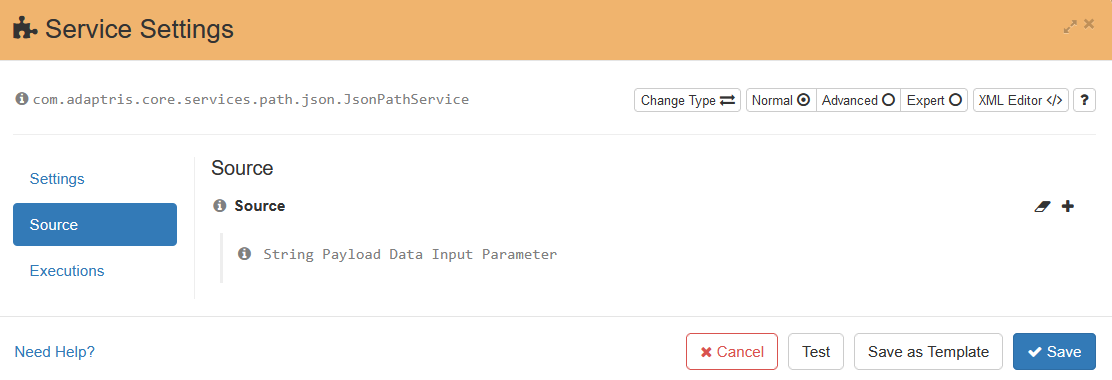
The ‘Executions’ tab
This is where you’ll find the point at which we make all of our queries. You should see a list of executions and they in turn can be expanded to show each query we make. In the ‘Json Path Service’ those executions should be set to ‘Json Path Execution’, their Source should be set to ‘Constant Data Input Parameter’ and the Target should be set to ‘Metadata Data Output Parameter’
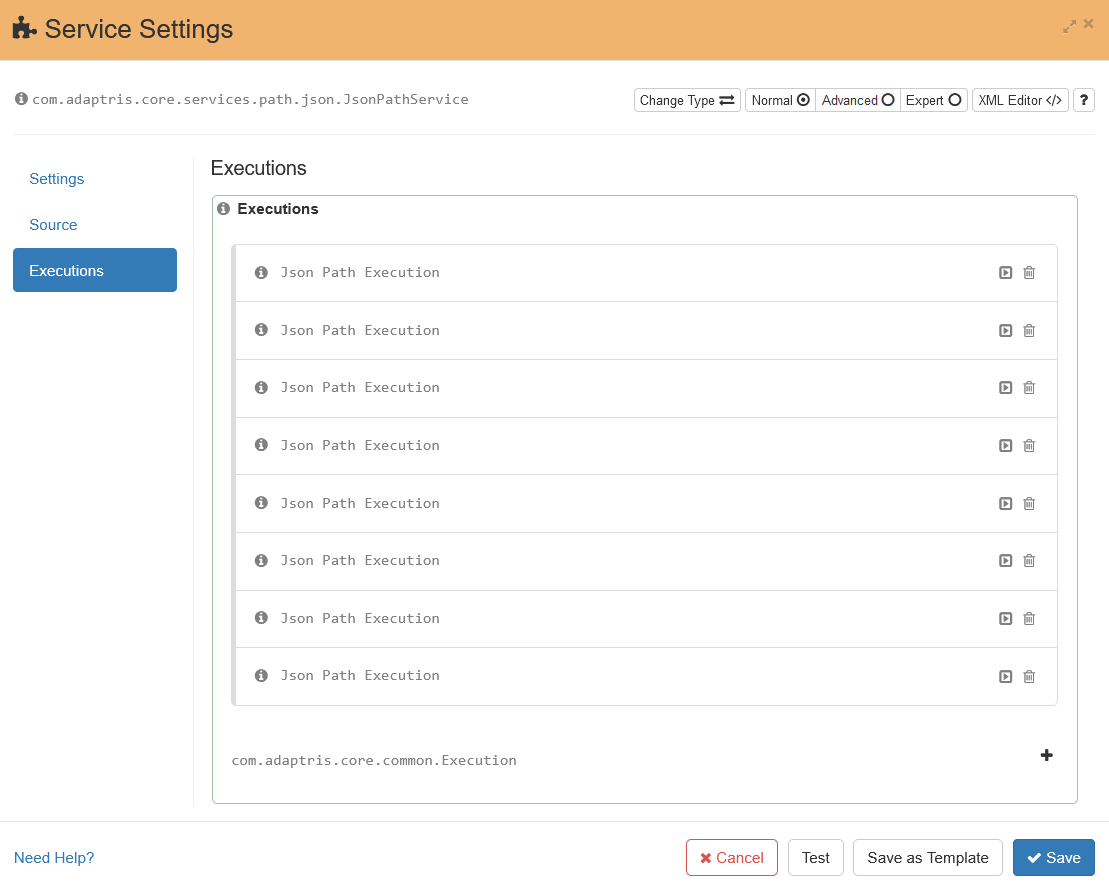
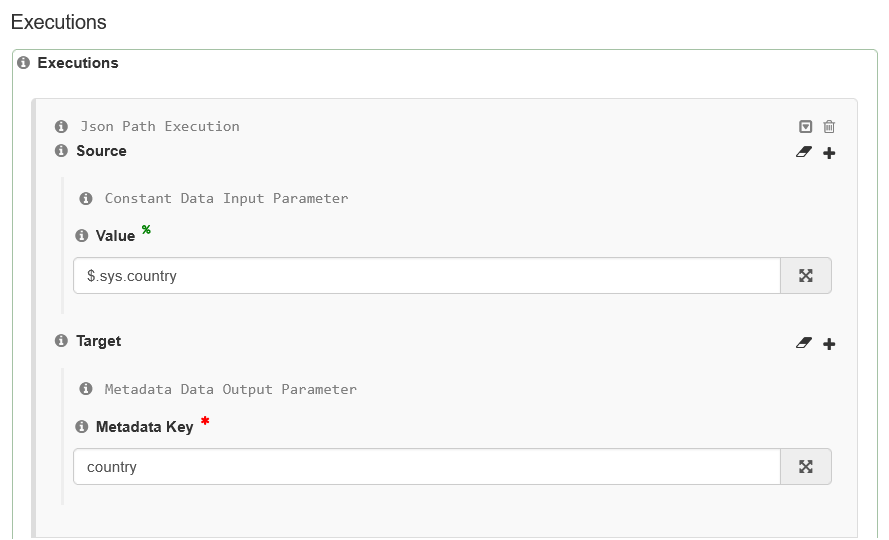
The JsonPath ‘Add Payload Service’

The Metadata queries
In the executions what we do is pair the value we want with a corresponding metadata key. For example the value $.sys.country now has the key country so when we call %message{country} in the ‘Add Payload Service’ we expect in this instance for the value ‘GB’ to be returned.
Location: %message{city}, %message{country}
Weather condition: %message{conditions}
Temperature: %message{temp}°C
Feels like: %message{feelslike}°C
Wind Speed: %message{windspeed} metres/sec
Wind Direction: %message{winddirection}°
Humidity: %message{humidity}%
The result is a weather forecast output to a text file which should look like this:
Location: London, GB
Weather condition: light rain
Temperature: 12.51°C
Feels like: 5.74°C
Wind Speed: 10.3 metres/sec
Wind Direction: 100°
Humidity: 93%

